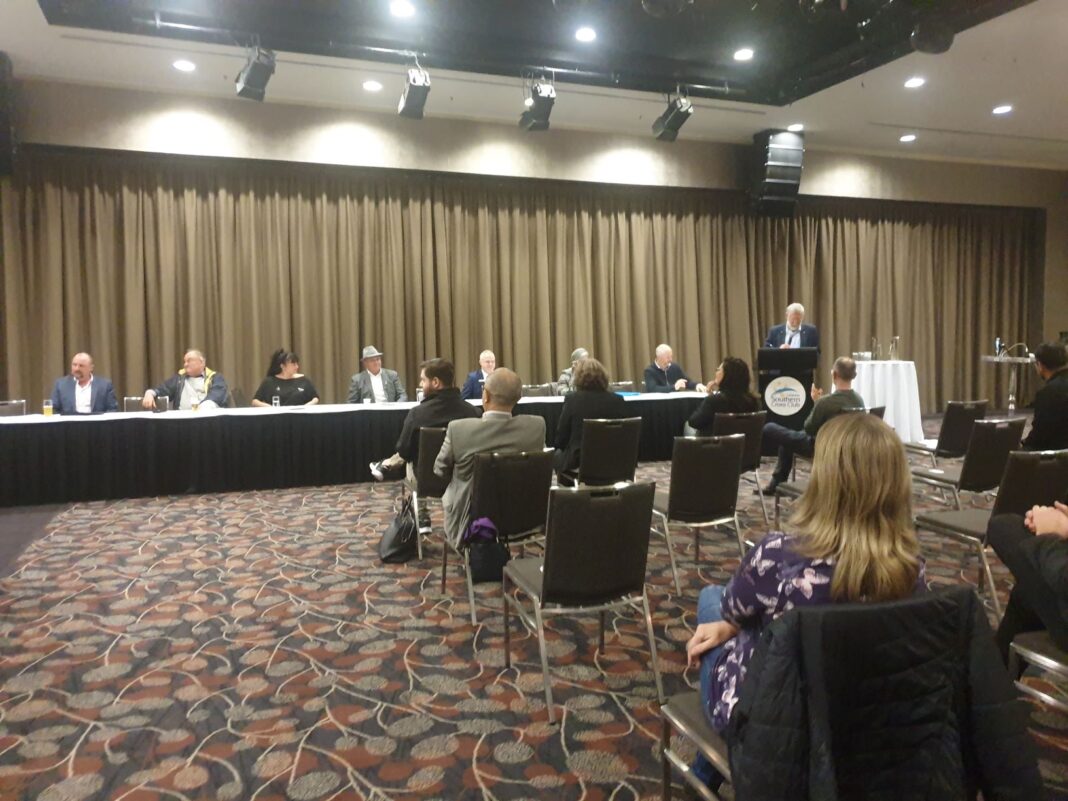There were strong “Don Chipp vibes” at Woden’s Southern Cross Club last night (Thursday 3 September) when candidates from the ACT’s minor parties presented their policy priorities for the upcoming ACT election and declared their intention to hold the government of the day accountable.
The Minor Party Showcase was hosted by former member of the ACT Legislative Assembly, Michael Moore, who told the physically-distanced crowd of fewer than 100 people that a strong crossbench made for a strong democracy.
“Most of us are pissed off at the major parties,” Mr Moore said.
“Most of us don’t vote for the best, we vote for the least worst.”
The forum touched on the full spectrum of political issues, but dominant themes of the night included local land development, community consultation, and desires for a more robust democracy with greater diversity of opinions.
Canberra Progressives candidate, Robert Knight, told the crowd his party was created five years ago for people who found “no natural home” in mainstream politics.
Fellow Progressives candidate, Peta Swarbrick, said she didn’t feel represented by the three men in leadership.
“They were produced by the party machine, they walk and talk to the party lines.”
In a very 2020 moment, a Sustainability Australia candidate was unable to attend because they were self isolating, but sent an apology and a claim they were the “sensible centre”, standing for community consultation, and an end to undue political influence of vested interests and over development.
David Pollard Independent wanted to remain … independent.
“An independent crossbench makes all sides better,” he said.
“People listen to good ideas, challenge bad ideas and provide scrutiny.”
The Australian Climate Change Justice Party representative Mr Petar Johnson said despite Canberra’s position as one of the most prosperous places in the world, there were 25,000 people unemployed and major waste in the $6 billion budget.
“We are not facing the challenges of this century,” he said.
“Climate change is here and it’s real and will change our way of life.
“All roads lead to the Legislative Assembly, if you want change.”
Former Liberal party stalwart, Bill Stefaniak, and Angela Lount were present to represent The Belco Party.
Mr Stefaniak used the Belconnen pool as an example of what independents could achieve and decried Don Chipp’s famous “keep the bastards honest” promise as he called for government accountability.
Ms Lount said despite having been a Labor voter her entire life, she joined the Belco Party because she felt Labor was no longer listening.
“I have four children,” Ms Lount said. “The youngest is 21, the oldest is 25 and they are struggling to buy a house. I have to make a difference.”
The nation’s emerging minor party powerhouse, the Shooters, Fishers and Farmers Party, was represented by Gordan Yeatman, who, in typical rustic fashion, apologised for being a terrible public speaker.
“I’ll probably have one foot in my mouth the whole time,” Mr Yeatman joked.
“But I’m just someone who’s had enough of government overreach.
“There is a disconnection between government and the people, and zero consultation.”
Former public servant and legislative drafter Alvin Hopper represented the Community Action Party and said “sweeping changes” to the electoral system were necessary but he wanted to be realistic.
“The coalition has betrayed the electorate,” Mr Hopper said.
“They do deals behind closed doors with little community consultation.
“It’s a fait accompli or, as American gangsters say, it’s a done deal.”
Independent candidate and president of the Woden Valley Community Council, Fiona Carrick, said she was driven by her passion for retaining shared public spaces.
“We’ve (Woden) lost the basketball courts, tennis courts and bowling greens, and now the ice skating has gone to Tuggeranong. We don’t have anywhere to go to meet as a community.”
The candidates struck a conciliatory and respectful tone throughout the night.
As they answered questions from the crowd, they reached consensus on preferencing each other ahead of the major parties and urged the crowd to follow suit.
They agreed to work together to create “a better Canberra” and agreed on a policy of open adoption of each other’s policies, when appropriate.



